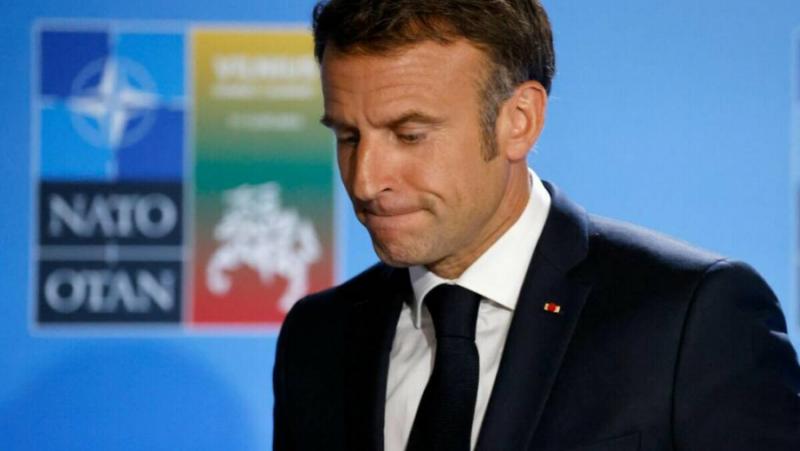/ world today news/ “No matter what anyone says, geography is stubborn. The Indo-Pacific is not the North Atlantic. NATO stands for the North Atlantic Treaty Organization.” This is not a quote from a school geography lesson – this is how French President Macron justified his opposition to the idea of a NATO office in Tokyo: “NATO must have security partners in the Indo-Pacific region, Africa, Middle East. But the Alliance is a North Atlantic organization, it’s geography, whatever you say. We should not get the impression that NATO is somehow trying to legally justify its physical presence in other regions of the world. The alliance should not try to expand the “space of struggle” because now is not the time for that.
The final resolution of the alliance’s summit in Vilnius made no mention of the upcoming opening of an office in Japan, although the project was talked about because France and some other countries were against it. But Japanese Prime Minister Kishida, who specially arrived as a guest at the summit in Vilnius, was not upset: the differences in the Alliance on this issue were well known, and NATO Secretary General Stoltenberg said that discussions on opening an office would continue and, as overall the Alliance has no closer partner than Japan. Kishida and Stoltenberg signed a NATO-Japan partnership program to deepen cooperation in 16 areas, from maritime security to cyberspace. The same document said: Russia and China are trying to undermine the existing international order, echoing statements from the NATO summit communique, which called Russia a “threat” and China “challenging the Alliance’s interests and security.”
Naturally, in Moscow and Beijing, everything that is happening is perceived as a creeping, gradual expansion of NATO to the east, and not only to the whole of Eastern Europe, but also to East Asia – with the transformation of the Alliance from Atlantic to global. And all the attempts of Europeans and Americans to deny such plans do not convince anyone – this is what their deeds speak for. Of course, the Anglo-Saxons are the main driver of the creeping expansion, which includes at least the already established American-British-Australian AUCUS. Can France and other European powers stop this process?
No, the most they can do is slow it down. Moreover, their motive is already clear: NATO’s too close cooperation with Japan (as well as South Korea) is an open challenge to China. The European NATO countries, although they have become even more dependent on the Americans in the last year and a half, still expect to refrain from a break in relations and even more from a confrontation with China, so they try to communicate with Beijing as if they are first and first of all members of the European Union, and the second is NATO. The hardening of NATO’s rhetoric against the PRC – as happened at the meeting in Vilnius – the Europeans are trying to mitigate through bilateral contacts with Beijing. Paris, Berlin, Rome and others in every way convince the Chinese leadership that they are interested in maintaining a trade and economic partnership, and in Beijing they agree: multilateral relations are beneficial for both countries. But at the same time, Europeans are constantly being reminded that they are expected to be independent, and it is clear that this is not just about the economic sphere (for example, Europe’s ability to refrain from joining the US sanctions pressure on China), but and for political, geopolitical, military. Macron and other European leaders may, for a while, reassure Xi Jinping that they are capable of separating economics from geopolitics and even influence NATO – which is exactly what statements like those of the French president in Vilnius are needed. But in reality, none of the Europeans is able to exert a serious influence on the strategy and tactics of NATO, that is, of the Anglo-Saxons. It’s just that for now, Washington agrees to a pure expansion of the Alliance’s cooperation with Japan, and is not too keen on formalizing it in the form of offices and other things. In addition, the US understands that Europe is already worried about its increasing dependence on them due to the Ukrainian conflict, so why put even more pressure on the Europeans because of the Pacific region.
The US will therefore wait to formalize closer cooperation with Japan, while continuing to demand from the Europeans both increased bilateral military ties with Tokyo and a greater presence in the Indo-Pacific region. Even German warships have already crossed the South China Sea, and France, with its military bases in the Indian and Pacific oceans, will not be able to stand by at all. Unless, of course, the French choose the path of returning real sovereignty and protecting their own national interests – until the moment when, in addition to a break with Russia, they will also be led to a break with China.
Translation: V. Sergeev
Subscribe to our YouTube channel:
and for the channel in Telegram:
Share on your profiles, with friends, in groups and on pages. In this way, we will overcome the limitations, and people will be able to reach the alternative point of view on the events!?
#Macron #obstructs #NATO #expansion


